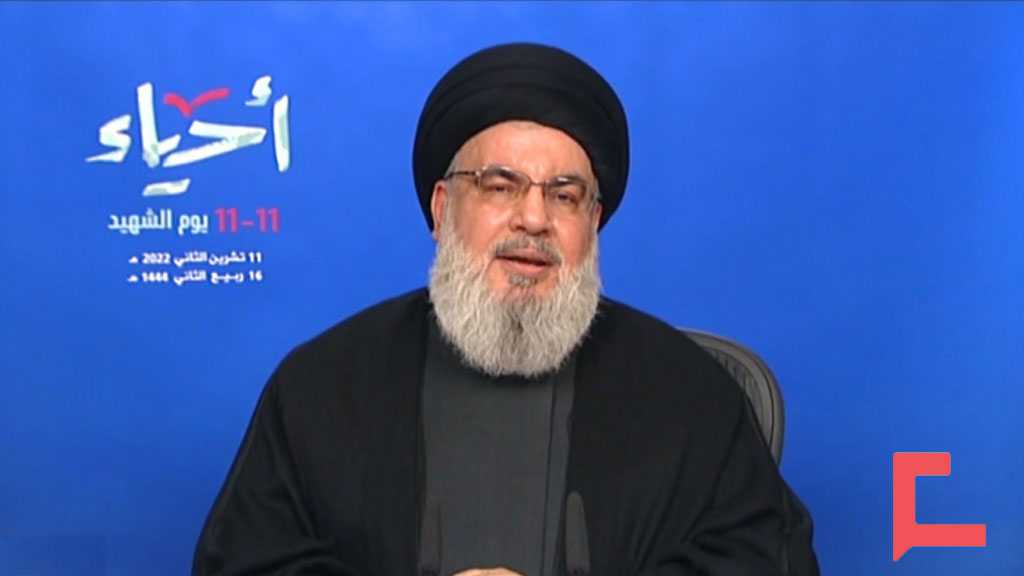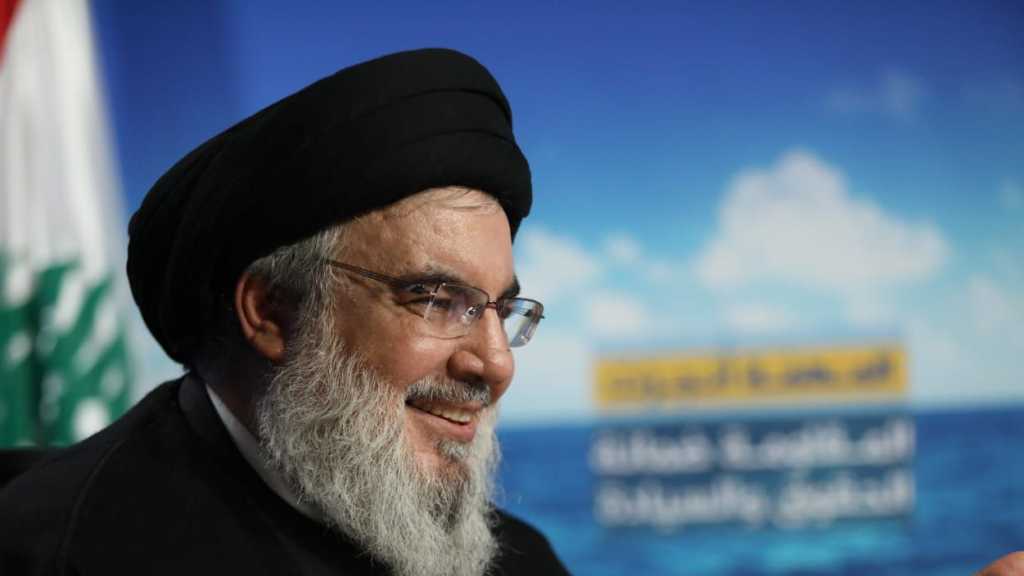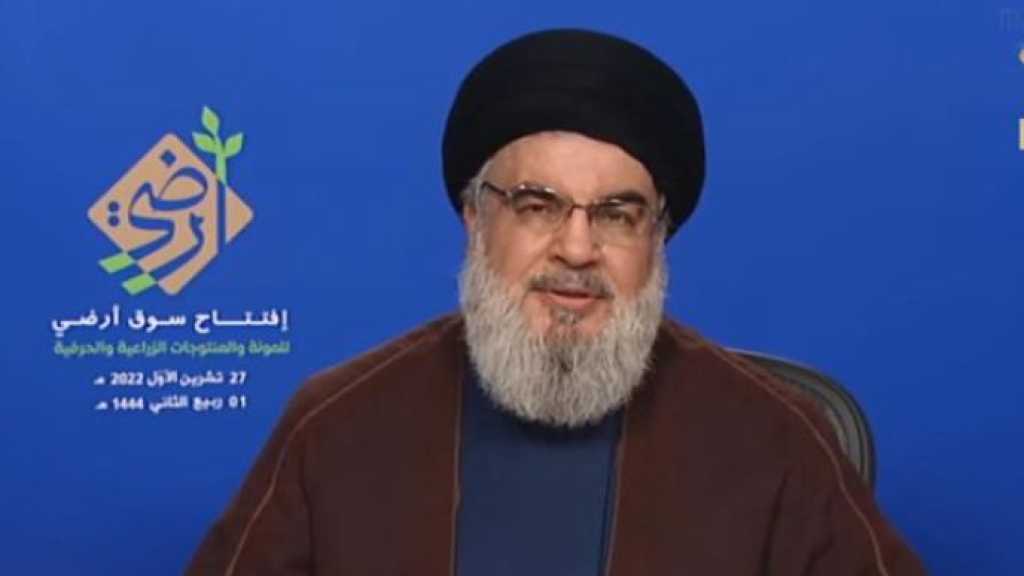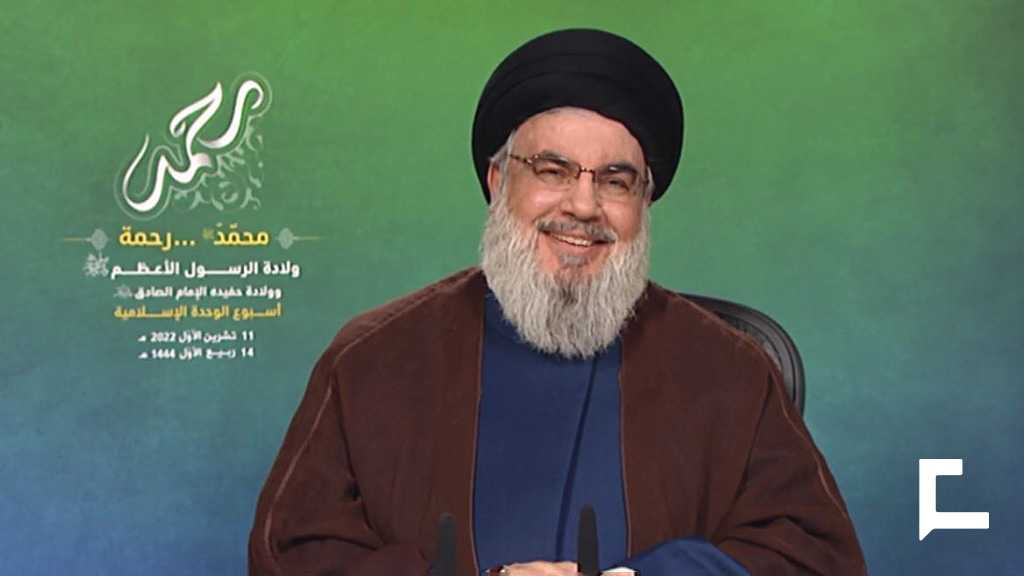
Sayyed Nasrallah Warns of Lebanon’s Economic Crisis: Oil Extraction Our Main Hope
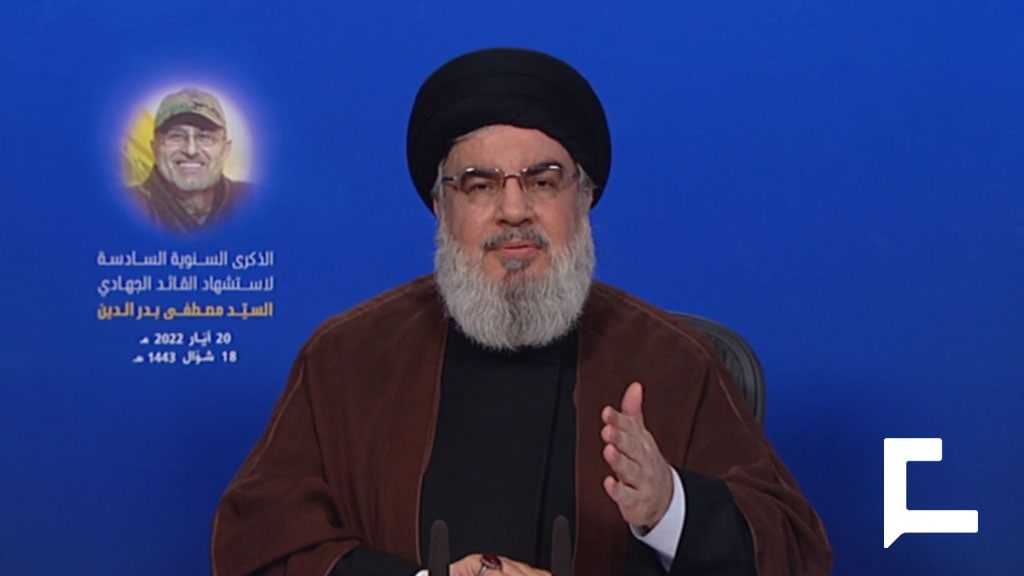
By Al-Ahed news
Hezbollah Secretary General His Eminence Sayyed Hassan Nasrallah delivered on Friday a speech during the memorial ceremony commemorating the martyrdom anniversary of leader Sayyed Mustafa Badreddine [Zolfiqar].
At the beginning of his speech, Sayyed Nasrallah hinted that Many of the features and characteristic of Leader martyr Baddredine have been unveiled in many reports. “Martyr Sayyed Mustafa Badreddine was very brave, willful, enthusiast, smart, serious, creative, innovative, and rhetorical. He was a poet who composed poems for Al-Quds, Palestine and the Our Noble Imams [Peace Be upon Them].”
According to His Eminence “Sayyed Zolfiqar is one of the symbols of an entire faithful generation in Lebanon and the region like martyr leader Hajj Imad Mughniyeh. With his name, Zolfiqar, he was present in all the fields, i.e. in Palestine, Lebanon and Syria.”
On another level, he lamented the fact that “May 15 Nakba wasn’t a catastrophe of Palestine, but the Nakba of all Arabs. It’s an incident whose calamities and pains are endless. For 74 years, this region and its people have been suffering from the consequences of that catastrophe created by the Zionist entity.”
“The Palestinian people don’t wait Arab regimes, an Arab League, or the United Nations anymore, they’ve made their choice for resistance,” the Resistance Leader confirmed, pointing out that “Today, the most important thing in face of this catastrophe is the position of the Palestinian people, particularly what is happening in the past weeks, and ‘the sword of Al-Quds’.”
He further stressed that “The Palestinian people made their choice a long time ago, and today they are present in all arenas and battlefields, and I believe that the overwhelming majority of the Palestinians support the choice of resistance much more than ever.”
In parallel, Sayyed Nasrallah underscored that “Lebanon was about to face something like the Palestinian Nakba had the ‘Israeli’ occupation was allowed to remain on the Lebanese lands.”
He also wondered: “Imagine Lebanon’s fate if there hadn’t been a resistance in 1982. If this occupation were to continue and there was no resistance, what would the situation of Lebanon be during the past and present? What catastrophe would have the Lebanese suffered?”
“Sayyed Mustafa Badreddine and his friends neither waited the international community nor the Arab League, they rather started resisting the occupation ever since the early hours of the ‘Israeli’ invasion,” His Eminence recalled.
He went on to say: “There were various forces in 1982 Khalde battle. The Amal Movement had a strong presence, along with the Syrian forces and the national parties. Sayyed Badreddine and his generation did not wait for any Arab, Islamic or international decisions to launch resistance. He was with various resistance factions and he almost got martyred there.”
“Nobody in the Arab World should think that they can protect Lebanon; this Arab World couldn’t defend Palestine even when it was strong and united,” Sayyed Nasrallah emphasized, noting that “What protects Lebanon is our people, resistance, will, and trust in Allah and relying on Him.”
Considering that “The relation with the Arab world can help psychologically, economically and in tourism, but it can't protect Lebanon,” he viewed that “No one should be delusional that the Arab world is capable of protecting Lebanon. It was not able to protect Palestine when it was united and cohesive, what about now?”
In response to those who propose that the alternative in face of “Israel” is the Lebanese state, His Eminence raised the following question: “What did that state do to liberate Lebanon in 1982? They resorted to the worst option, which was negotiations with the enemy, after which they signed a treaty that humiliated Lebanon.”
“Only our people, will and resistance can protect Lebanon,” he said, noting that “Many Arab states possess the most advanced weapons, but they are coward enough to confront the ‘Israeli’ enemy.”
In addition, he denounced the fact that “The May 17 Agreement was supported by a long and broad Lebanese team that is calling for sovereignty today!”
However, Sayyed Nasrallah stated that “The resistance, with all its factions and forces, is what revoked the May 17 Treaty.”
Urging the Lebanese to seek a just and capable country, he clarified that “What is key about it is the authority that rules this state, and its connections. The generation of Sayyed Zolfiqar and Hajj Imad Mughniyeh, which many generations have joined, is the one that protected Lebanon and has been protecting it until this day.”
Meanwhile, His Eminence uncovered that “The resistance contributed to discovering and dismantling many ‘Israeli’ spying networks in cooperation with the Lebanese security apparatuses.”
In this context, he warned that “In light of the resistance’s capabilities, the ‘Israelis’ are in need of agents, and recruitment has begun in an improper and unprofessional manner.”
“The Lebanese security apparatuses are determined to dismantle those spying networks and we call on all leaders to support this tendency,” the Resistance Leader assured, calling the Lebanese Military Judiciary “to issue harsh and deterrent rulings against the spies of the ‘Israeli’ entity.”
Hailing the choices made by the political team that Hezbollah and its allies form as “always been right”, he underlined that “they have been proving to be victorious ever since 1982.”
“After 40 years, our choices and the choices of our political team have won,” he said.
“The battle of al-Qusayr established the battle for liberating the areas along the Lebanese borders such as Qalamoun and al-Zabadani, in which martyr Badreddine played a leading role,” His Eminence stated, noting that “‘Israel’s’ ambitions regarding Syria's resources will be exposed.”
Explaining that “The issue in Lebanon is about choices ever since the ‘Israeli’ invasion, through the global war on Syria, until this day,” Sayyed Nasrallah recalled that “On the issue of Syria, there were options, there are those who remained neutral. Imagine if the global war on Syria had won? This conflict still exists.”
On the Lebanese economic crisis, Hezbollah Secretary General warned that “Today, in Lebanon we are facing great and very dangerous challenges. We’re concerned with preserving this country and its identity, sovereignty and perseverance.”
As he predicted that “We’re heading to a domestic situation that is characterized by a lot of challenges,” he viewed that “The imminent challenge is the economic and living crisis, the bread, medicine, and electricity, not the weapon of the resistance.”
“Electricity of Lebanon warned that the country is heading to complete darkness, there is no flour, the dollar is rising, cancer medicines are not available, and the diesel tank may reach one million L.L,” His Eminence cautioned, warning that “In Lebanon, we do not have the of time, and this requires emergency efforts in parliament and in the formation of the government process.”
In response, he called for postponing the issue of “the resistance’s weapons for two more years, because it is not a pressing issue and you have coexisted with them since 2005.”
To those who debating national affiliations, Sayyed Nasrallah announced that “Hezbollah is most concerned with preserving the country and its identity.”
“We are not the people who possess dual passports and properties abroad. We were born here and are to be buried here, and no one expects that we will weaken or abandon our country, for which we sacrificed all this precious blood,” he declared, noting that “Those who say that they want reform and want to fight corruption are a majority, but there is no majority for one camp over another in this parliament.”
Denouncing the fact that “The one that mostly knows the team which we are calling for partnership is the US, and its David Schenker,” His Eminence said: “The country that would benefit the most from restoring ties with Syria is Lebanon. Showing openness towards the East and the West would allow us to prevent explosion and restoring ties with Syria would allow us to address the refugee crisis.”
“According to experts, some countries that normalized ties with ‘Israel’ are on the brink of economic collapse, one of which started selling its assets,” he unveiled, noting that “During the past two days, I heard some international economic experts say that 64 countries are destined to collapse, including Lebanon, and among them are countries that normalize with ‘Israel’.”
Urging all Lebanese sides to shoulder responsibility as “we are in an extraordinary situation,” he assured that “Oil extraction is the main hope for the way out of our crisis, not beggary and World Bank loans.”
Comments
